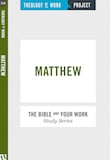The Great Commandment is a Great Framework (Matthew 22:34-40)
Bible Commentary / Produced by TOW Project
Jewish leaders in Jesus’ day often fought over the relative importance of commandments. Some held the view that observing the Sabbath was the most important of all commandments. Others valued circumcision over all else. Still others would have believed, as many modern Jews do today, that the most important commandment is found in Deuteronomy 6:5 “You shall love the Lord your God with all your heart, and with all your soul, and with all your might.”
So when a lawyer asks Jesus to weigh in on the question, “Which commandment in the law is the greatest” (Matthew 22:36), he might be asking Jesus to pick sides in an already contentious debate.
Yet Jesus plunges into a new area of insight by answering not only which commandment is the greatest, but how people might go about fulfilling it. “Love the Lord your God with all your heart, and with all your soul, and with all your mind,” Jesus says, and then he adds a second commandment, from Leviticus 19:18 “love your neighbor as yourself,” which he joins with the first commandment by saying it is “like it.” (See the TOW Bible Commentary on Leviticus 19:17-18.) Through Jesus’ logic, loving God is linked inextricably to loving other people. John echoes this statement when he says, “If anyone says he loves God but hates his brother, he is a liar.” (1 John 4:20)
Work is a primary way through which we love other people. Our workplaces are often the places where we encounter the widest diversity of people, and their nearness to us day after day gives us the unique challenge of loving people who are different from ourselves. We also love others through our work when our work meets the important needs of customers or other stakeholders. For more examples see “Our Work Fulfills the Great Commandment” (Mark 12:28-34) and “The Good Samaritan at Work--Loving Your Neighbor as Yourself (Luke 10:25-37).”
But Jesus not only commands us to love others but to love others as we love our own selves. What does this look like in the workplace? It looks like a cook double-checking the internal temperature of a hamburger after someone says “Does that look all right to you,” because that’s what she would do if cooking the hamburger for herself. It looks like a sales clerk calling over a more-experienced colleague when a customer asks a question he is not sure he knows the answer to—rather that giving an answer he thinks is right—because he would want that information himself before buying. It looks like a mechanic stripping apart the brake job he just completed because he heard a strange noise and that’s what he would do before driving his own car. It looks like a businessman asking his colleagues, “Is it possible we’re not taking her seriously enough because she’s a woman?” knowing that he would want a colleague to stand up for him when he’s being misunderstood.
Don't Follow the Crowd (Click Here to Read)In this daily reflection from The High Calling, Mark Roberts asks us, "When have you been tempted to follow the crowd into doing wrong? What helps you to stand against what is wrong in order to honor God?" |
These are small examples, yet each of them may come at a price—a lost commission, an hour of unbillable time, a short night’s sleep, access to the inner circle of power. All of our labor has the potential to serve, and therefore love, our neighbors. But to love a neighbor, as yourself, may require taking risks that we would surely take in order to serve our own ends, but which loom large when undertaken only for the benefit of someone else. It is truly a high bar, and perhaps that is why Jesus joins “love your neighbor as yourself” with “love the Lord” in the Great Commandment.









